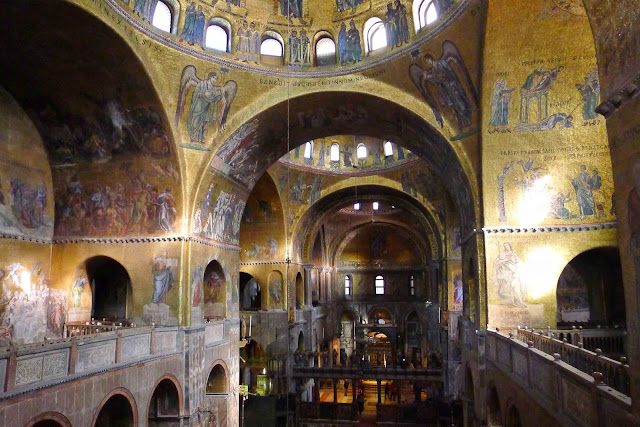Of all the sights in London, only one place can claim to be as historically significant as it is significantly haunted. Built in 1078 by the Norman King, William the Conqueror, the Tower of London has served as a royal palace, armory, treasury, zoo and most famously, a prison where some of the most famous characters in English history have been imprisoned, tortured and executed. Today, the fortress is one of London's most famous tourists spots, as it also houses the Crown Jewels of the UK.
* After getting of the
Tower Hill Tube Station, expect to take a 15 minute pleasant stroll towards the main entrance of the Tower.
* This Roman-esque building found directly across the Tower is the former
Port of London Authority Building. Once the largest port in the world, the Port of London has been central to the growth and development of the city since the Roman foundation in the 1st Century AD.
* While the
Normans (Vikings who settled in the Northern area of France called Normandy) built the central area of the fortress, the whole complex has been
expanded several times, mainly under the reigns of
Richard the Lionheart (of Crusader fame),
Henry III and Edward I.
* A great example of medieval siege weaponry, the
Trebuchet is a form of
catapult that uses a counterweight. My inner video gamer got giddy as I remembered the various times I used this siege engine to conquer my enemies in
Total War and other historical Real-time strategy games.
* The
Main Entrance to the Tower of London, where thanks to our
London Pass we skipped the line and headed right in!
* The
White Tower was the
first building ever constructed here and is the
heart of the whole fortress. This tower contains the national collection of arms and armour, as well as the
Chapel of St. John the Evangelist, a finely preserved example of Norman architecture and one of London's oldest churches.
* The
Arms and Armory exhibit contains an impressive collection of cannons, swords, shields and armor, including those used by the Kings themselves. Check out how HUGE Henry V's sword is next to that kid on the right!
* On the
St. Thomas Tower, one can see a faithful recreation of
King Edward I's
prayer room (left),
coronation throne (upper right, the original of which can be seen in Westminster Abbey) and bedchamber (lower right). Quick to anger, greatly intimidating and very tall for a man in that time period, Edward I was nicknamed
"Longshanks."
*
Traitor's Gate (upper right) has the infamous reputation of being the entrance gate (albeit, soaked) for all sorts of prisoners, scoundrels and innocent folk brought forth from trial in Westminster Hall. It also doubles as the
best vantage point to take a picture of Tower Bridge (upper left).
* You can't have a fortress and not have guards; who in this case are the
Yeoman Wardens. Fondly known as the
Beefeaters, this 30 plus group of gents (who all have served distinguished military services in the armed forces) have historically had the job of looking after the prisoners and protecting the crown jewels. Today, they stand proud as touristy photo attractions, tour guides and wearers of really awesome armor!
* The view from the top of one of the towers is astounding! Apart from the previously mentioned Port of London Building (left), you can also see the
Gherkin, that egg shaped building found in the
middle of London's main financial district.
* The
main attraction for most women here is undoubtedly the
Jewel House (left), built to house the
Crown Jewels of the English monarchy including the
Imperial State Crown (containing 2,800 diamonds?!), the
Sovereign's Scepter (containing the world's largest diamond) and the
Sovereign's Ring (referred to as the wedding ring of England), among other bejeweled crowns, scepters, swords and orbs. For obvious reasons,
no cameras are allowed inside. Other places of note include the
Tower Greens (upper right), which is the
execution spot of aristocratic prisoners including
Anne Boleyn and Catherine Howard, and the
Tower Ravens (lower right), which legend states that if they leave the Tower, the monarchy will fall soon after.
*
For guys, however, the
main attractions have definitely got to be the
Bloody Tower, where the
killing of the Little Princes (the brothers Edward and Richard) took place, and the
torture exhibit in
Wakefield Tower, showing the various torture methods inflicted on the poor souls incarcerated within. Other famous prisoners housed here include:
William Wallace (Braveheart),
Lady Jane Grey (Queen for Nine Days),
Guy Fawkes (V for Vendetta), and
Rudolf Hess (deputy leader of the Nazi Party).
* With its dark past, it's no wonder that the Tower is widely agreed upon to be the
Most Haunted Place in London, where the
ghosts of Anne Boleyn, Henry VI, Lady Jane Grey and the Princes of the Tower are frequently seen, felt and reported by tourists, Beefeaters and night staff. Curiously, the Tower also once served as a
menagerie (zoo), showcasing the various animals gifted to the English monarchy by foreign kings and dignitaries. At one point,
polar bears, lions, leopards and monkeys once called this place home. Today only their sculptures remain, randomly scattered throughout the complex.
* The
Tower Bridge, often mistakenly called the London Bridge (which is actually a different bridge found further down the Thames), is one of London's most iconic symbols and can be found just outside the Tower of London.
Best vantage point for taking photos is right on top of Traitor's Gate.



















Comments
Post a Comment